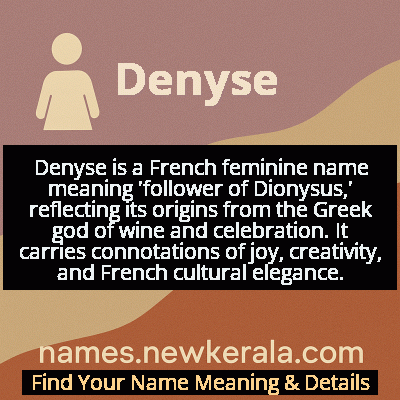Denyse Name Meaning & Details
Origin, Popularity, Numerology Analysis & Name Meaning of Denyse
Discover the origin, meaning, and cultural significance of the name DENYSE. Delve into its historical roots and explore the lasting impact it has had on communities and traditions.
Name
Denyse
Gender
Female
Origin
French
Lucky Number
9
Meaning of the Name - Denyse
Denyse is a French feminine name meaning 'follower of Dionysus,' reflecting its origins from the Greek god of wine and celebration. It carries connotations of joy, creativity, and French cultural elegance.
Denyse - Complete Numerology Analysis
Your Numerology Number
Based on Pythagorean Numerology System
Ruling Planet
Mars
Positive Nature
Generous, passionate, energetic, and humanitarian.
Negative Traits
Impulsive, impatient, moody, and can be overly emotional.
Lucky Colours
Red, maroon, scarlet.
Lucky Days
Tuesday.
Lucky Stones
Red coral, garnet.
Harmony Numbers
1, 2, 3, 6.
Best Suited Professions
Military, sports, philanthropy, leadership roles.
What People Like About You
Courage, energy, leadership, generosity.
Famous People Named Denyse
Denyse Plummer
Singer
Trinidadian calypso singer who won the Trinidad and Tobago Calypso Monarch competition
Denyse Tontz
Actress and Singer
American actress known for roles in 'The Young and the Restless' and 'Faking It'
Denyse Thomasos
Artist
Trinidadian-Canadian abstract painter known for large-scale architectural-inspired works
Denyse Lage
Actress
Brazilian actress known for numerous telenovela roles and theater performances
Name Variations & International Equivalents
Click on blue names to explore their detailed meanings. Gray names with will be available soon.
Cultural & Historical Significance
Throughout French history, the name Denyse has maintained a presence in aristocratic and bourgeois families, often symbolizing both cultural refinement and religious devotion. In French-Canadian communities, the name traveled to North America with early settlers and became established in Quebec and other French-speaking regions of Canada, where it continues to represent French cultural identity. The name's persistence across centuries demonstrates its ability to bridge traditional values with evolving social norms, making it a timeless choice that honors heritage while remaining relevant in modern contexts.
Extended Personality Analysis
Women named Denyse are often perceived as possessing a unique blend of sophistication and warmth, reflecting the name's French origins and mythological roots. They tend to be creative individuals with an appreciation for beauty and culture, whether expressed through artistic pursuits, fashion sense, or social grace. The Dionysian connection suggests a capacity for joy, celebration, and emotional expression, making Denyses often charismatic and engaging companions. At the same time, the name's French heritage implies a certain elegance and refinement in demeanor.
Denyses are frequently described as having strong social intelligence, able to navigate various social situations with poise and diplomacy. They may exhibit a natural leadership quality tempered with empathy, and often demonstrate resilience in facing challenges. The combination of these traits typically results in women who are both practical and imaginative, capable of bringing beauty and organization to their endeavors while maintaining meaningful personal connections. Their balanced nature allows them to be both grounded and inspirational, making them valued friends, partners, and colleagues who bring harmony and creativity to their relationships and professional environments.
Modern Usage & Popularity
In contemporary times, Denyse maintains a steady presence primarily in French-speaking regions, particularly in France, Quebec, and French communities worldwide. While not among the most popular names currently, it enjoys a classic status that prevents it from becoming dated. The spelling 'Denyse' is less common than 'Denise' in English-speaking countries, which gives it a distinctive French flair. Recent years have seen a mild resurgence as parents seek traditional names with international appeal and strong cultural roots. The name is particularly favored by families with French heritage who want to honor their background while choosing a name that works well in multicultural settings. Its usage remains consistent rather than trendy, appealing to those who appreciate its historical depth and elegant sound without being overly common.
Symbolic & Spiritual Meanings
Symbolically, Denyse represents the harmonious blending of celebration and devotion, drawing from its dual heritage of Greek mythology and Christian tradition. The connection to Dionysus symbolizes creativity, joy, transformation, and the life force itself—qualities of fertility, artistic inspiration, and the breaking of conventional boundaries. Simultaneously, its association with Saint Denis brings meanings of faith, martyrdom, and spiritual leadership. This creates a rich symbolic tapestry where earthly pleasures and spiritual aspirations coexist. The name also carries connotations of French elegance and cultural sophistication, symbolizing refinement, diplomacy, and aesthetic appreciation. In a broader sense, Denyse represents the integration of passion and discipline, celebration and responsibility, making it symbolic of balanced feminine power that honors both tradition and individual expression.

